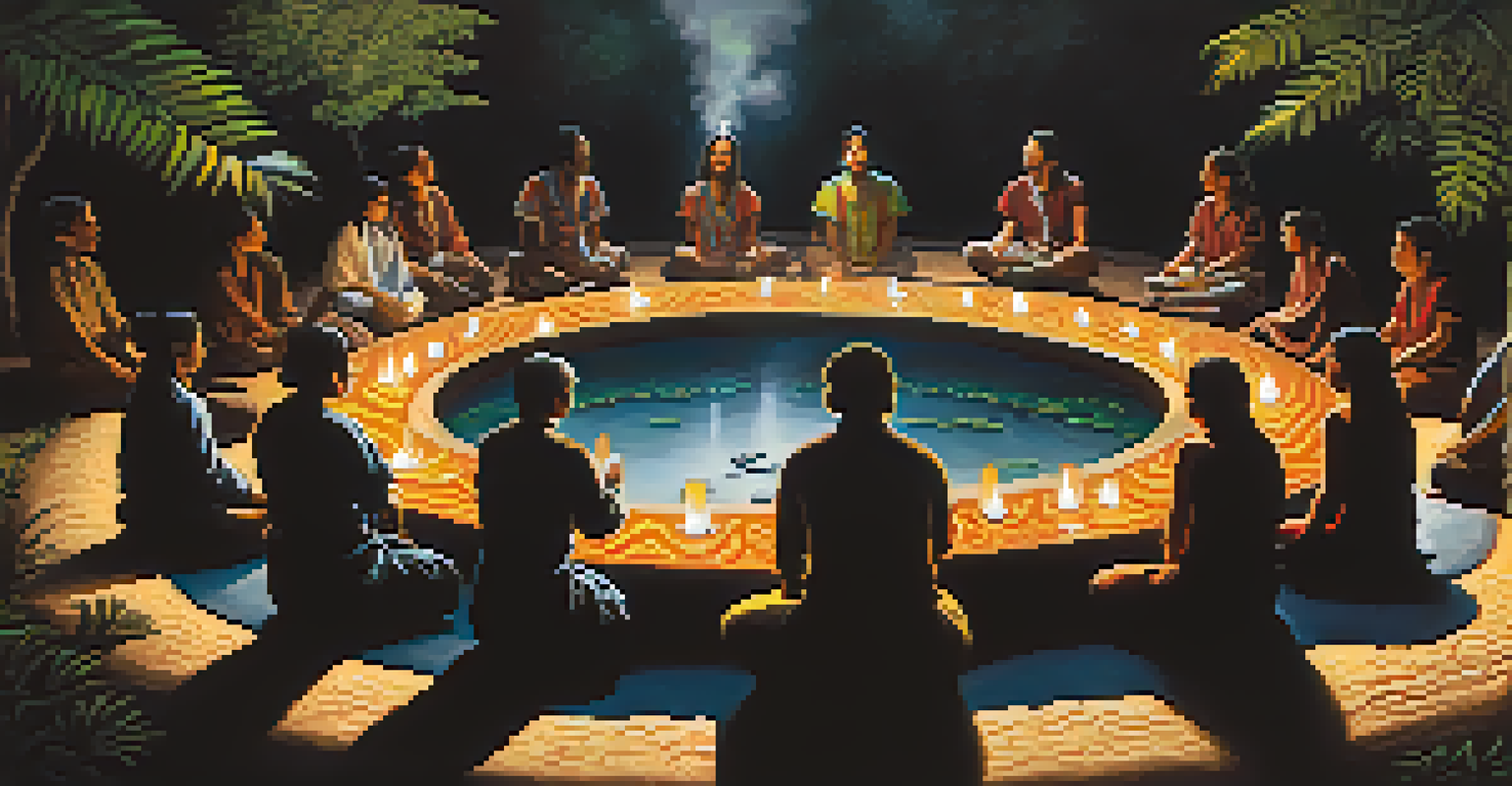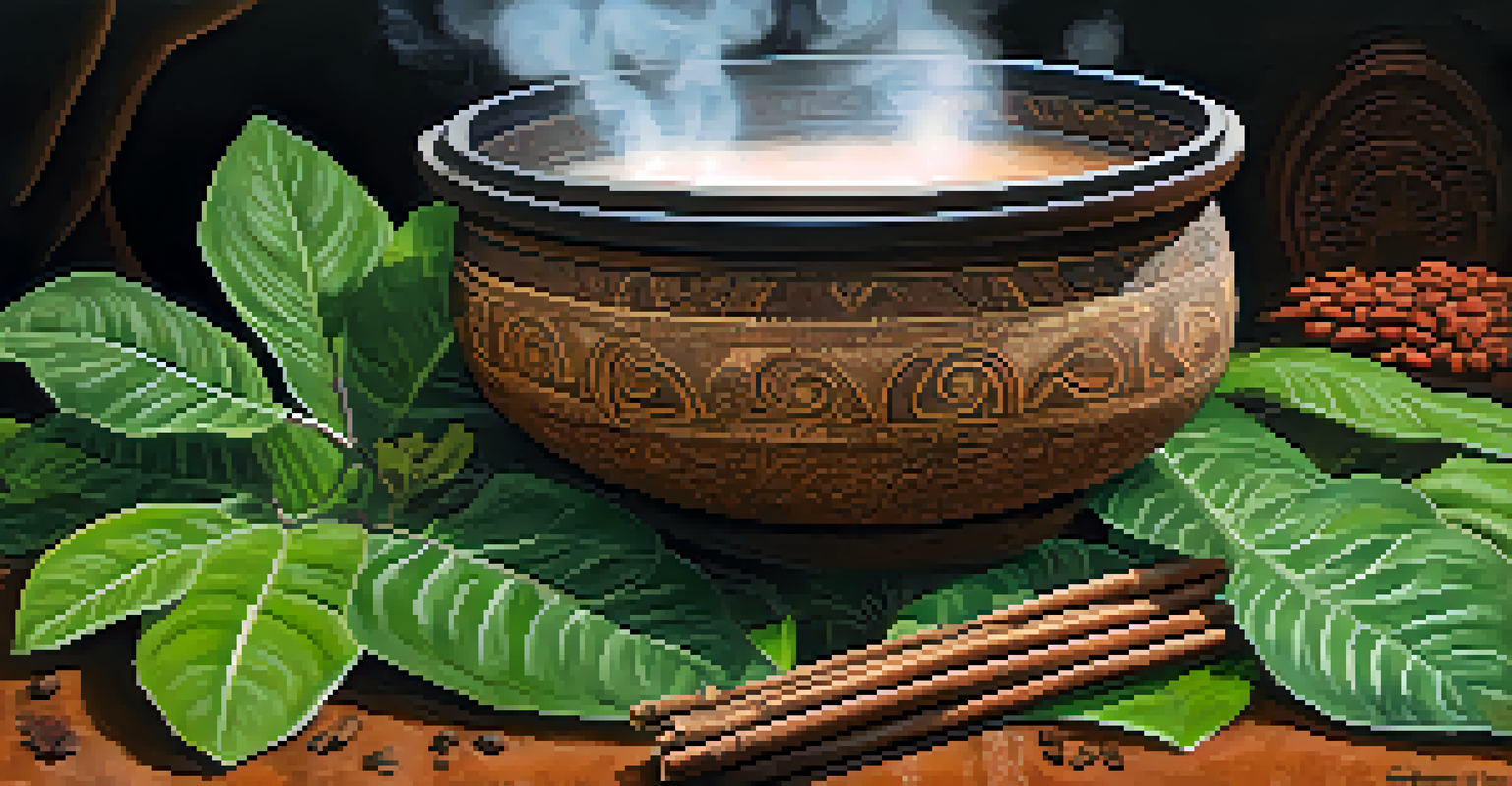Cultural Aspects of Community in Ayahuasca Experiences

Understanding Ayahuasca and Its Cultural Roots
Ayahuasca, a traditional Amazonian brew, has deep cultural significance among indigenous communities. It is often used in spiritual ceremonies, where participants seek healing, guidance, and connection with nature. The brew combines two main ingredients: the Banisteriopsis caapi vine and the leaves of the Psychotria viridis plant. This unique combination not only creates a powerful psychoactive experience but also holds cultural importance as a rite of passage in many tribes.
The greatest gift of Ayahuasca is the opportunity to connect with the wisdom of the indigenous cultures that have used it for centuries.
The origins of Ayahuasca can be traced back centuries, intertwining with the cultural practices of various Amazonian tribes. Each group has its unique rituals and beliefs surrounding the use of Ayahuasca, showcasing the diversity of this ancient practice. For instance, the Shipibo-Conibo people of Peru emphasize the importance of song, or 'icaros,' during ceremonies, believing these melodies can guide participants through their journey.
As Ayahuasca gains popularity beyond its traditional context, it raises questions about cultural appropriation and respect for indigenous practices. Understanding the cultural roots of Ayahuasca is crucial for anyone seeking to participate in these experiences, as it helps foster a deeper appreciation for the wisdom held by these communities.
The Role of Community in Ayahuasca Ceremonies
Community plays a pivotal role in Ayahuasca ceremonies, transforming individual experiences into collective healing. When participants gather, they create a supportive environment that enhances the overall experience. This communal aspect fosters a sense of belonging and shared purpose, allowing individuals to feel safe and open during their journey.

In many traditional settings, experienced shamans or facilitators lead the ceremonies, guiding participants through the process. This guidance is crucial, as the Ayahuasca experience can be intense and overwhelming. The presence of a knowledgeable leader helps participants navigate their emotions and insights, reinforcing the importance of community throughout the journey.
Cultural Roots of Ayahuasca
Understanding the cultural significance of Ayahuasca and its traditional practices is essential for respectful participation in ceremonies.
Moreover, community bonding often continues long after the ceremony ends. Many participants report forming lasting friendships and support networks, helping them process their experiences. This ongoing connection emphasizes how Ayahuasca not only serves as a tool for personal growth but also strengthens social ties among participants.
Cultural Rituals Enhancing Ayahuasca Experiences
Rituals surrounding Ayahuasca ceremonies are steeped in cultural significance and enhance the overall experience. Common elements include purification practices, such as fasting or cleansing rituals, which prepare participants both physically and mentally. These rituals create a sacred space, allowing individuals to enter the ceremony with intention and focus.
Healing is a collective journey, and Ayahuasca provides a space for individuals to share their truths and support one another.
Additionally, the use of traditional music, often performed by shamans, plays a vital role in shaping participants' journeys. The 'icaros' serve not only as a means of healing but also as a way to connect with ancestral wisdom. The melodies may evoke emotions, memories, or insights, further deepening the experience and reinforcing the cultural aspects of the ceremony.
These rituals help participants feel grounded in their cultural context, emphasizing the importance of respecting the traditions that have shaped these practices. Engaging with these rituals allows individuals to honor the lineage of Ayahuasca, fostering a deeper understanding of the cultural elements that influence their experience.
Shared Experiences: Bonding Through Ayahuasca
One of the most profound aspects of Ayahuasca experiences is the shared journey among participants. As individuals undergo their personal transformations, they often find common ground with others in the group. This shared vulnerability creates a unique bond, fostering empathy and understanding within the community.
Participants frequently describe feeling an overwhelming sense of interconnectedness during their experiences, as if they are part of a larger whole. This feeling can lead to deep discussions and reflections, helping individuals process their insights in a supportive environment. The connections forged during these ceremonies often extend beyond the immediate experience, creating lasting friendships.
Community Enhances Healing
The communal aspect of Ayahuasca ceremonies fosters shared healing experiences that strengthen bonds among participants.
By sharing their stories and insights, participants contribute to a collective narrative that enriches the community experience. This sense of shared purpose not only enhances individual journeys but also reinforces the importance of community in the context of Ayahuasca healing.
Respecting Indigenous Knowledge and Practices
As Ayahuasca spreads beyond its traditional roots, respecting indigenous knowledge becomes increasingly important. Many indigenous communities possess a wealth of wisdom regarding the plant and its effects, cultivated over generations. Engaging with this knowledge fosters a deeper appreciation for the cultural context surrounding Ayahuasca use.
Participating in ceremonies led by indigenous shamans ensures that the practices remain authentic and respectful. These shamans often serve as cultural ambassadors, sharing their knowledge and traditions with participants. By honoring their role, individuals can connect more deeply with the spiritual aspects of Ayahuasca and the community surrounding it.
Furthermore, supporting indigenous communities through fair compensation for their services helps protect their cultural heritage. This respect for traditional practices not only enhances individual experiences but also promotes a more sustainable and ethical approach to Ayahuasca tourism.
Challenges of Cultural Appropriation in Ayahuasca Use
Cultural appropriation is a significant concern in the context of Ayahuasca experiences, particularly as they gain popularity in Western societies. Many individuals seek out Ayahuasca for its therapeutic benefits without understanding the cultural significance behind it. This can lead to practices that disregard the traditions and rituals that have been carefully preserved by indigenous communities.
Those who participate in Ayahuasca ceremonies must be aware of the potential harm caused by commodifying sacred practices. It is essential to approach these experiences with humility and a genuine desire to learn from indigenous cultures. Engaging in dialogue and educating oneself about the cultural context can help mitigate the risks of appropriation.
Respecting Indigenous Practices
Engaging with indigenous knowledge and ensuring authentic practices is crucial to honor the traditions that shape the Ayahuasca experience.
Ultimately, fostering respect and understanding for the cultural aspects of Ayahuasca can lead to more meaningful experiences for participants. By prioritizing cultural sensitivity, individuals can honor the traditions that have shaped Ayahuasca, ensuring that their journeys are both enriching and respectful.
The Impact of Ayahuasca on Personal and Collective Healing
Ayahuasca has the potential to facilitate profound personal and collective healing, making it an attractive option for many seeking transformation. Participants often report experiencing emotional release, increased self-awareness, and a deeper connection to their spirituality. These insights can lead to significant shifts in perspectives, fostering personal growth.
Moreover, the communal aspect of Ayahuasca ceremonies amplifies these healing effects. As individuals share their experiences and support one another, the healing process can extend beyond personal insights to collective transformation. This communal healing can create ripples of positive change, impacting not just individuals but the broader community as well.

Ultimately, Ayahuasca serves as a bridge between personal and collective healing, emphasizing the interconnectedness of all participants. By engaging with the cultural aspects of Ayahuasca experiences, individuals can deepen their understanding of how these ceremonies contribute to healing on multiple levels.